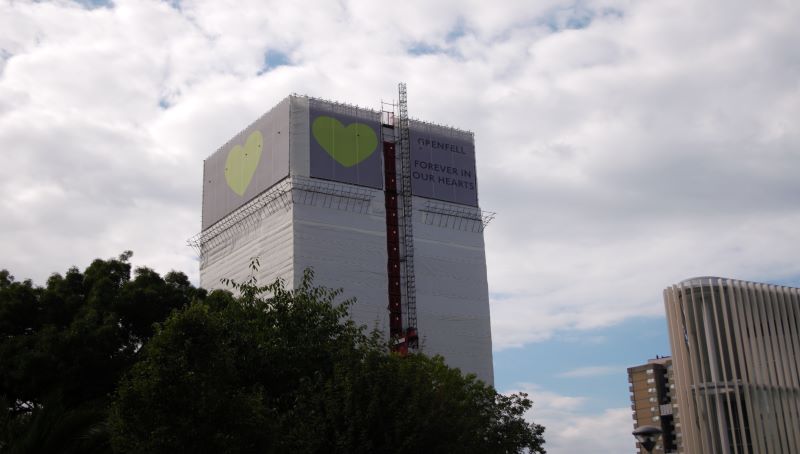
By Danielle Aumord.
Survivors and the bereaved chronicle the chaos they experienced in the immediate aftermath of the Grenfell Tower fire (11 – 28 April 2022)
Grenfell fire survivors and bereaved family members shared their experiences of inadequate support in the immediate aftermath of the Grenfell Tower fire, where 72 people died on the 14 June 2017.
The Grenfell Tower fire has been described as a tragedy on a scale not seen in decades on British shores and as exposing acute divisions in society, dangerous weaknesses in social housing, planning and fire regulations, and a gaping lack of trust between some of the most vulnerable in society and the authorities charged with their care.
Yet survivors of the disaster and bereaved family members have told the public inquiry into the blaze that they were treated like “criminals and crooks” as they desperately tried to find out information about their loved ones in the immediate days after the disaster.
Nabil Choucair, who lost six family members of his family members in the fire, told the inquiry that he was threatened with arrest as he frantically searched for them, with the emergency response to the disaster “falling apart” around him.
Karim Mussilhy, whose uncle Hesham Rahman died in the fire, also said
that they were “abandoned”. He told the public inquiry that the communication from official sources such as the police was so poor after the tragedy that the first time,he had any inkling that his uncle had perished was when he saw London Fire Brigade t-shirts placed in front of the tower the day after the disaster.
Firefighters had written notes on them, one of which said, “to all those on the 21st floor and above we are sorry we couldn’t get to you”.
Hesham Rahman, Mr Mussilhy’s Uncle, lived and died in Flat 204 on the 23rd floor of the Grenfell Tower. He had health problems and struggled with his mobility, the inquiry heard, but the council still placed him near the top of the building without assessing his ability to escape in an emergency.
Paul Menacer, 28, who lived on the sixth floor of the tower, was called by a friend on the night of tragedy to alert him to the fire and to frantically urge him to get out.
He knows that he was fortunate to escape with his life, but Mr Menacer has also told Housing Quality Network that there was no government or council support for survivors and bereaved family members for up to nearly four days after the fatal blaze: “Some survivors from the fire were sleeping in their cars immediately after the fire and the help we received tended to be from the local community.”
Lawyers for the bereaved and survivors set out the details of why they felt that the response to the tragedy failed so epically. When taking the bigger picture into account, it was heard that the response failed because of inadequate disaster response arrangements in the UK, which place reliance on unsupervised local government arrangements to take charge.
“There is no sophisticated system somewhere in central London with plans, data and specialists that can grasp reality quickly and effect change,” Danny Friedman QC said, appearing for one group of bereaved and survivors. “That is a fantasy. [The] entire system is wagered on the local authority having the capability and capacity to deal with matters on the ground.”
He said that in the case of Grenfell, “that wager fundamentally failed and the system crashed”.
Lawyers also said that the response failed because the Royal Borough of Kensington and Chelsea (RBKC) was not just a crisis responder but was also deeply implicated in what had just happened. “The crisis was political because the disaster was undeniably human-made, and its victims remained under the governance of those in part who made it,” explained Mr Friedman.
He said that the council suffered a “disconnect” from the impacted community, a consequence of “the degraded nature of local government and democracy that had come to exist in this part of the city”.
We also heard that at the first gold command meeting on the morning of the fire, Kensington and Chelsea Tenant Management Organisation (KCTMO) was given time to assure that the tower’s refurbishment had been signed off by building control and to commission a PR firm to put this message out.
A ’gold command meeting’ is a meeting where national or local governmental bodies establish a response strategy for dealing with a crisis, such as the response to the Grenfell fire.
Kensington and Chelsea Council also appears to have propagated negative information about the survivors of the fire. It was said in a meeting the day after the fire that there was “great concern over community tension”, with “hostile residents very vocal in negative comments towards the incident” despite the lack of any police intelligence to support this.
The council claimed that “hurt and anger” was being “stoked by a small number of known local instigators who continued to fabricate stories to further their aims” and said it “might need assistance from the police”.
Government officials on a watching brief took this on board and fed back to Whitehall: “Worried about community tension, several embittered residents painting the situation in a very poor light. Incite a mob.”
“RBKC’s efforts to instil fear of the crowd against our clients could not have underscored more why it was inappropriate and unjust for response and recovery [from the fire] to remain under its control,” Mr. Friedman QC told the inquiry into the deadliest British structural fire since the 1988 Piper Alpha disaster and the worst residential fire since the Second World War.





